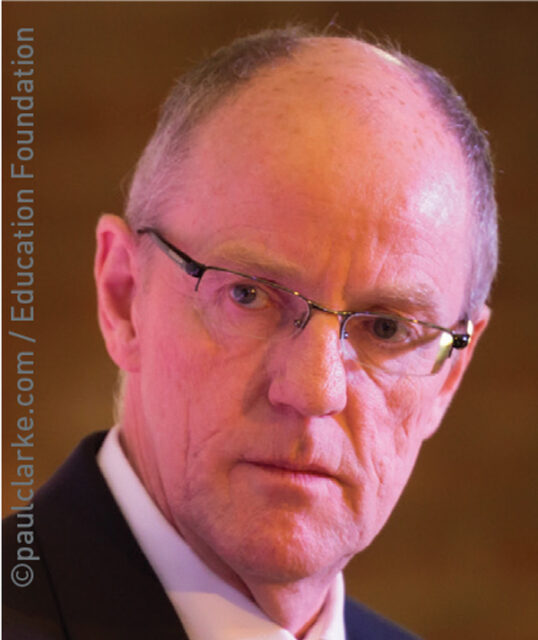Eight schools are set to get £10,000 to help spread “excellent phonics teaching” – but the Government should review other approaches about learning to read, say headteachers.
Schools minister Nick Gibb (pictured right)announced on Tuesday that grants of £10,000 would be given to eight groups of schools – led by “top-performing” primaries – to help them to spread their expertise to other schools.
The groups would include those “seeking to make rapid improvements in their phonics teaching”.
But the systematic teaching of phonics is already well-established in primary schools and the money should be invested in a different way, says Lynn Knapp, head of Windmill Primary School in Oxford.
“For some children phonics is not quite the right approach. Often children who are dyslexic find phonics difficult, so we find we have to offer a variety of approaches.”
Given the focus on phonics since the introduction of annual phonics check three years ago, Ms Knapp questions the need for more money to embed the practice in all schools.
“For me, rather than focusing solely on phonics it would make more sense to invest money in how children learn to read effectively and become literate.
“For £10,000 you could invest in some good research into what makes a difference and what doesn’t with children who aren’t responding to phonics.”
The president of the National Association of Head Teachers, Tony Draper (pictured top), who is head of Water Hall Primary School in Bletchley, Milton Keynes, backed her view: “She is spot on the mark. Phonics is a very valuable tool – but it is not the only tool. I believe the phonics screening check (PSC) has served its purpose.
“They should be putting more effort into learning more about the outcomes of other methods of teaching reading, so that all children have access to varied approaches to learning how to read. One size does not fit all.”
The Government’s emphasis on the systematic teaching of phonics as a key to reading success was undermined last month with the publication of a three-year evaluation of the phonics screening check.
The evaluation carried out for the Department for Education (DfE) by the National Foundation for Educational Research did not find evidence of improvement in literacy or in progress that could be attributed clearly to the annual test.
Announcing this week’s initiative, Mr Gibb said that three years on from the introduction of the PSC “100,000 more six-year-olds each year are on track to become confident, proficient readers.
“But I want to go further and ensure all children across the country are benefitting from the excellent phonics teaching I have seen first-hand in our best schools”.
Schools Week understands a key distinguishing feature of the strongest proposals from schools wanting to lead partnerships was their commitment to teaching systematic synthetic phonics as the prime strategy for word recognition. The partnerships will set clear objectives to enable them to measure the impact of their activities, so the DfE can monitor the effect of the grants.
A DfE spokesman said: “This funding allows schools to share their expertise and will ensure more children are benefitting from excellent phonics teaching. The evidence is clear that phonics is the most effective method for teaching literacy for all children.”








I think it is positively scary and dismaying that we still have primary headteachers who believe there is an alternative method to phonics provision for teaching dyslexic children and who still call upon the expression ‘One size does not fit all’ – and who still think we need ‘research’ regarding the efficacy of what to teach to raise levels of literacy. No-one suggests that all the children are the same but there is only ‘one’ alphabetic code to be taught to all of them regardless of the children’s individual differences.
The headteachers’ comments suggest a real lack of professional knowledge and understanding about the international body of research regarding raising levels of literacy in the English language.
I would highly recommend that these headteachers visit the website of the ‘International Foundation for Effective Reading Instruction’ at http://www.iferi.org and aim to support them in raising their levels of professional expertise.
There is only one English alphabetic code that is the basis of our writing system and it is the most complex alphabetic code in the world. Teachers need to raise their levels of phonics expertise – not look for different methods. Children with dyslexic tendencies need the highest quality phonics teaching and learning opportunities – not a move away from phonics.
It is also extraordinary that anyone could think that children enabled to decode more efficiently are disadvantaged. Since Sir Jim Rose recommended the Simple View of Reading in 2006, the teaching profession should be able to understand the different processes involved for technical word decoding/recognition and language comprehension. There is a correlation between children who can decode words better being more likely to access text reading accurately – but their language comprehension (spoken language) is the other vital ingredient.
The NFER phonics reports make it clear that many teachers still use multi-cueing reading strategies in their practice – and that suggests they are unaware of how research shows us these can be damaging for children’s reading habits as a reliance on guessing words from various cues is not helpful for long-term reading. Again this is a matter of professional understanding (or lack thereof).
Nick Gibb is entirely correct to continue pursuing an emphasis on quality phonics provision and this pursuance is based on both research and leading-edge phonics practices in our schools.
“the evidence is clear!’ evidence does not have to be clear, it has to be factual, and reported without bias….the Tobacco industry produced plenty of clear evidence that smoking is good for your health